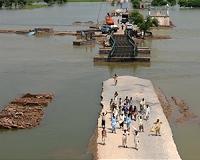| . |  |
. |
Islamabad, Pakistan (UPI) Sep 2, 2010 There is a link between deforestation in Pakistan and the massive floods sweeping the country, said an official with the World Wide Fund for Nature. "Had there been trees, they would have lessened the intensity of the thrust of initial peaks of flood," said Ali Habib, director general of WFN, reports IRIN, the news service of the U.N. Office for the Coordination of Humanitarian Affairs. Flood waters now cover approximately one-fifth of the country. There also is a link between Pakistan's "timber mafia" and the country's deforestation. The Herald Scotland newspaper quoted a Pakistani journalist as saying that Pakistani policemen took bribes from the timber mafia in exchange for allowing them to fell trees. The forests, he said, have been "ruthlessly exploited" by law enforcement agencies, politicians and bureaucrats for their own vested interests. The logs were stacked in gorges, ravines and "nullahs," or steep narrow valleys. When torrential rains hit Pakistan, the force of the runoff from the country's tree-barren mountains propelled the logs, turning them into instruments of destruction that smashed everything in their path, the Herald said. Pakistan's Dawn newspaper reported that 80 million trees had been cut down in the so-called protected Khebrani and Rais Mureed Forest in the three years leading up to this summer's floods. During that 36-month period, the forest had been reduced from nearly 20 square miles to barely 3 square miles. "The government is promoting 'Green Pakistan' even as trees continue to be slaughtered across the country in the name of development. The timber mafia is denuding the country's woodlands. The situation is desperate and is deteriorating by the day," a Dawn editorial said. Pakistani government figures show that about 4.1 percent of the country's land mass is forest. At the current 2 to 2.4 percent rate of deforestation, Pakistan's forest cover would be reduced to half of its 1995 extent by 2019-24, says the Food and Agriculture Organization. Tahir Qureshi, a Pakistan-based forestry expert for the International Union for the Conservation of Nature said that in 1947, when Pakistan gained independence from Britain, riverine forests had lined the banks of the Indus River. "These forests used to absorb the ferocity of the flood waters," he said. Qureshi said the riverine forests had been the first line of defense against floods that have deluged the plains annually for thousands of years. As rainwater gets trapped in leaves, branches and roots, forests serve to slow he flow of floodwater. Deforested areas, on the contrary, become more prone to flooding and landslides.
Share This Article With Planet Earth
Related Links Bringing Order To A World Of Disasters When the Earth Quakes A world of storm and tempest
 Pakistan landowners accused of diverting floods to villages
Pakistan landowners accused of diverting floods to villagesIslamabad (AFP) Sept 2, 2010 Wealthy landowners in Pakistan have allegedly diverted waters from the country's devastating floods away from their own properties and into villages, the country's UN ambassador said Thursday. Abdullah Hussain Haroon called for an inquiry into claims that embankments had been allowed to burst to protect commercial crops. "Over the years, one has seen with the lack of floods, those areas ... read more |
|
| The content herein, unless otherwise known to be public domain, are Copyright 1995-2010 - SpaceDaily. AFP and UPI Wire Stories are copyright Agence France-Presse and United Press International. ESA Portal Reports are copyright European Space Agency. All NASA sourced material is public domain. Additional copyrights may apply in whole or part to other bona fide parties. Advertising does not imply endorsement,agreement or approval of any opinions, statements or information provided by SpaceDaily on any Web page published or hosted by SpaceDaily. Privacy Statement |